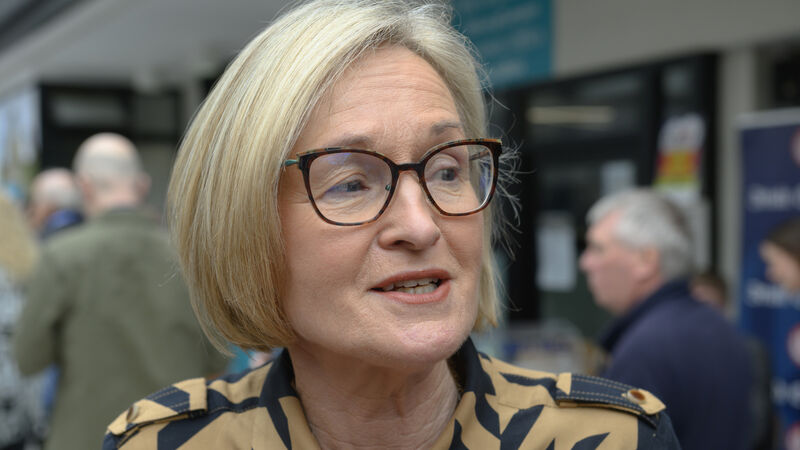Terry Prone: The touch paper has been lit for the presidential conflagration

Only a serious health issue would have taken Mairead McGuinness out of contention, and she will now become the best candidate Fine Gael ever lost for reasons outside of its control and hers. File Picture: Dan Linehan
It was like police officers tossing a flashbang into a barricaded house. Twice in the one day. We have to misquote Wilde: "To experience one flashbang may be unfortunate. To experience two within hours of each other is unprecedented."
Neither improved anybody’s understanding of anything. Both electrified everybody. The new guy nobody knew blew himself up. The favourite everybody knew extinguished her candidacy.
The departure from the race of Mairead McGuinness will provoke a kind of inapplicable sympathy vote, because of the references in her statement to a hospital stay and not having the strength to go through with a gruelling campaign.
To see McGuinness work a room is to see a dynamo in action, and being a relatable dynamo takes a lot of energy. Only a serious health issue would have taken her out of contention, and she will now become the best candidate Fine Gael ever lost for reasons outside of its control and hers.
The party will have to move on, of course. McGuinness, as a former journalist, will consume mainstream media today with a shrug. She will know and accept why journalists might speculate on the possibility of Fine Gael persuading Heather Humphreys to step in.

The next week or so will be characterised, within Fine Gael, by sadness and urgency, as the party does the “thinking ahead” mentioned by the leader in his audio message yesterday afternoon.
No sadness attaches to Gareth Sheridan’s self-detonation, which is what tends to happen to candidate if the candidate hasn’t walked through the possibilities in advance of their soft and hard launches, each of which was, for this candidate, spectacularly awful.
That’s the truly astonishing thing about politicians, particularly those who are new to the game. They don’t prepare for the unexpected.
You’d expect anybody who’s worked on any previous presidential campaign, if hired by Gareth Sheridan, to sit him down and cut through the PR. Like this:
"Gareth. Never mind all the smiley-face assertions that the parting with Seán Gallagher was amicable. How amicable can it be when a man is effectively told that he’s not up to the task ahead?"
"Gareth. Never mind all that stuff about how rich you are, tell us about how you can step away from a company capitalised to the gills which so far hasn’t sold a single unit of its product?"
It wouldn’t be tough to deduce that if your key campaign offering is that you’re 35, you’re a sitting duck for punishing questions because what have you put out other than your age?
As one politician recently remarked: “There’s a lot of us who are 35 who don’t believe it’s a unique selling proposition, much as we’d like.”

Into the vacuum of a vapid soft launch flowed nasty questions, this being the fulfilment of a natural law and a trope: Nature abhors a vacuum and journalists abhor one even more.
All of which said, if Gareth Sheridan had his wits about him, he could have answered the nasty questions and given the voters (who were paying attention to him precisely because of those nasty questions) some reason to give him consideration as a future tenant of the Áras.
He did not do that. Instead, he implied that mainstream media were being fed lists of questions which were all the same and complained bitterly about the time that would be taken by him to answer them.
Now, hold it right there. If the lists of questions coming in from different outlets are all the same, that greatly reduces the time taken to answer them. So the accusation made no sense.
Then, he went down the road to a place no candidate should ever go — presenting a scenario where a “circle” (no individual named, just an anonymous group) was attacking him, and the circle belonged around Seán Gallagher, although of course he wasn’t suggesting for a moment that Seán Gallagher was involved.
He worsened it by a rhetorical question suggesting everybody mightn’t have been happy with the separation. Since Seán Gallagher was the only one inconvenienced by the parting with his company, we were left to wonder who on Earth, other than Gallagher, he thought he was talking about.
What Sheridan is going to do about his situation is unlikely to be what he should do about it. He should immure himself with the best advisors available — people who have directed Presidential campaigns — for at least 48 hours, ideally longer, to work out where he is, how he got there, what needs to be done to rectify the situation, and what the characters waiting in the wings might do while he’s at it.
The problem is that people new to politics think that if you go silent and don’t answer media questions, media will punish you. This has always led to media appearances which are chaotic, media-satisfying, and candidate-destructive.
Up to now, it’s been opinion polls and speculation. Plus potential candidates like Frances Fitzgerald removing themselves from contention. Now, the relentless human conflagration our presidential elections have turned into is under way.






